The sudden appearance of small holes in gardens and lawns is more common than you think! Not only do these small holes can be frustrating, but they can also disfigure and destroy the lawn in the long run. Additionally, finding holes in your lawn could be a sign of a potential pest problem as well.
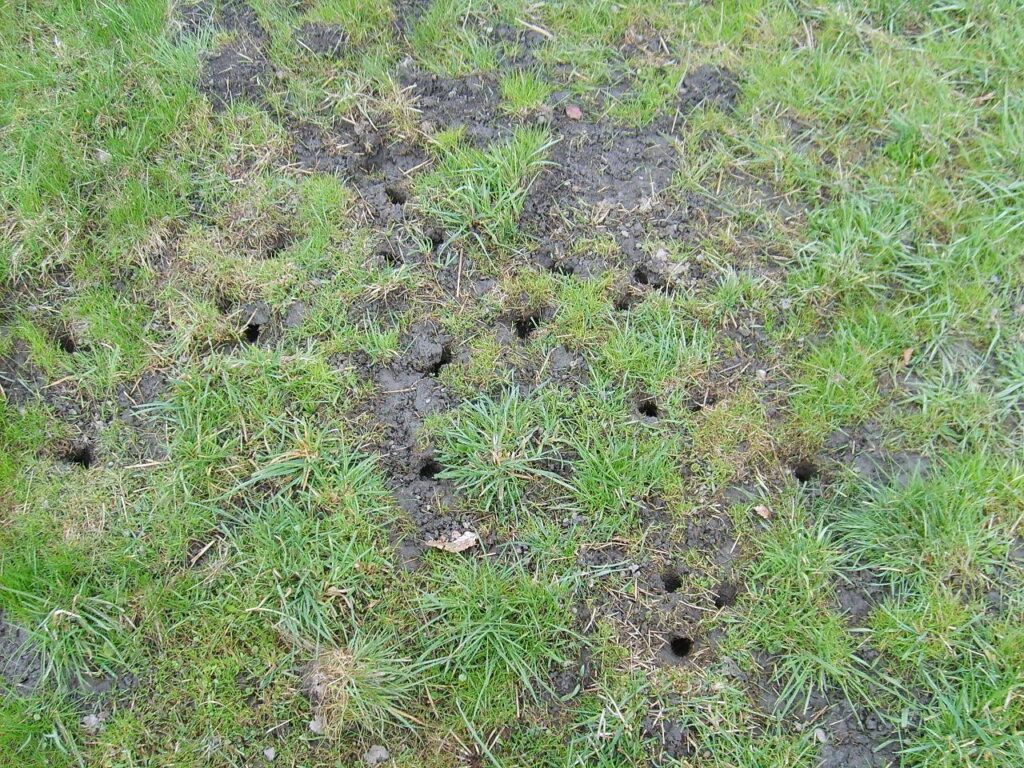
Finding small holes in the lawn overnight could indicate the presence of lawn pests.
So, when you have spent hundreds of dollars and taken hours out of your busy schedule to build your lawn, it is easy to imagine why finding small overnight holes in the lawn might make someone furious. However, you do not need to worry; we have got you covered!
Early identification and investigation of the culprit behind the lawn holes can help you save your lawn from further damage. It can also save you hundreds of dollars in lawn maintenance. So, if you are also finding small holes in your lawn overnight, this guide is for you.
We will tell you how you can identify the culprit behind the formation of holes in your lawn, what you can do to solve this problem, and how to avoid this issue in the future. Happy reading!
What’s causing small holes in my lawn?
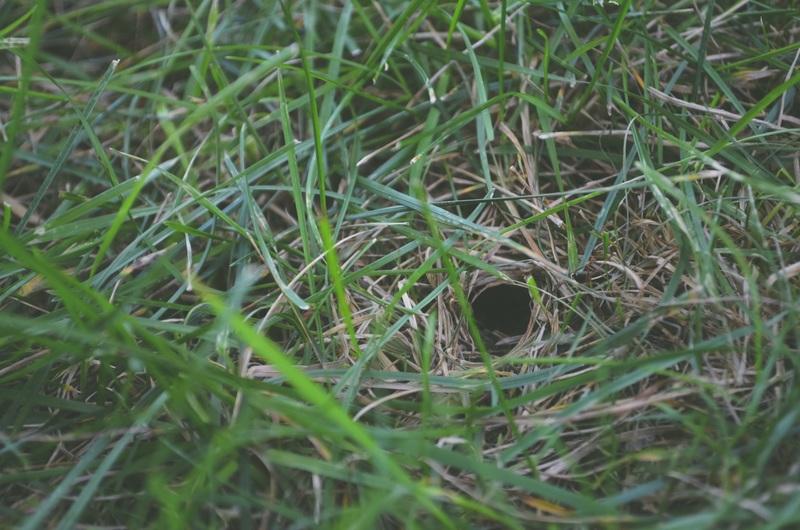
Ants, beetles and other insects, rodents, reptiles, and some wild animals are most likely the reason you are finding holes in your lawn.
Waking up and finding small overnight shallow holes is not exactly going to kick your day off to a good start! Also, you might spend the rest of your day wondering about the cause of these small overnight holes in your lawn. Finding what is causing these tiny holes is crucial for implementing the necessary preventive measures.
Nonetheless, more often than not, these lawn holes are dug by soil-dwelling insects, small rodents, and in some cases, reptiles. These animals dig holes to make homes or find food for themselves. Depending on the type of animal, the sizes and shapes of these holes will vary.
For instance, underground insects create small holes that are sometimes difficult to spot and often not much damaging to the turf. However, rodents and other animals have considerably bigger holes. You might also spot sunken grass around these holes. So, let’s explore and learn more about the causes behind lawn holes and what you can do to fix them.
Ants

The grubs of Japanese beetles can cause extensive damage to grass roots.
If you see small cone-shaped dirt mounds in your lawn, it is very likely that you are dealing with an ant infestation. If these ant hills are not eliminated, chances are that the infestation will spread to the remaining lawn as well. Not only do these conical mounds look ugly, but the ants can cause damage to the grass roots as well.
This does not just end here; ants attract birds. And most birds will start digging holes to find juicy insects hiding underground. In the process of feeding, these birds can damage a lot of grass blades, ruining the aesthetics of your lawn.
Like, some beetles also dig small round holes in the lawn. For instance, the Japanese beetles. These nasty insects lay eggs and bury them deep into the lawn soil. When the eggs hatch, grubs emerge. These grubs eat on the grass roots, which appear on the surface in the form of patches of brown dead grass.
Control
A little bit of insect activity in the lawn is a normal thing. Most insects only make pinprick-sized holes which is not something for which you should call the pest control service. However, suppose the damage to your turf is extensive. In that case, you can try using borax or diatomaceous earth to get rid of the insects.
Wasps
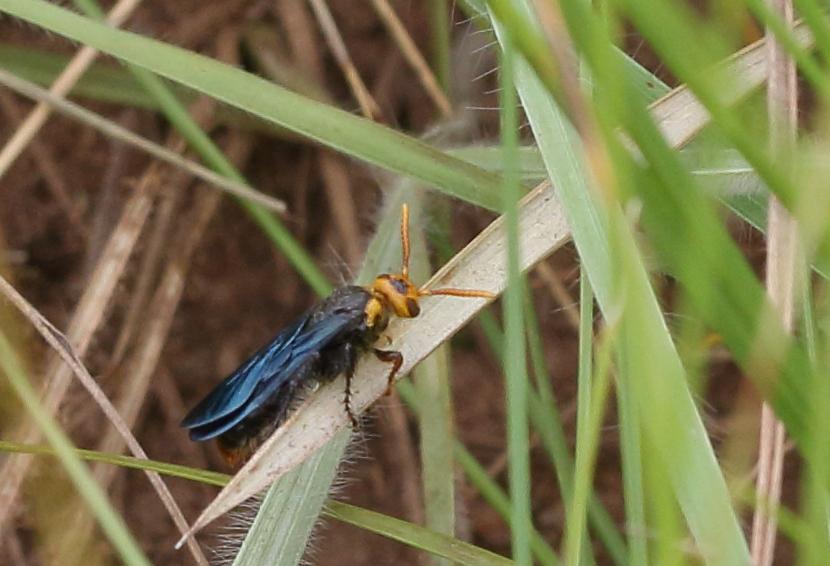
Wasps might also be the reason behind small holes in your lawn.
Cicada killer wasps and the Scoliid wasps can also be why you have small holes in your lawn. These wasps usually dig holes in places where the grass is small, and the surface is exposed. Cicada killer wasps might dig holes that are around an inch in diameter.
Scoliid wasps dig small holes compared to cicada killer wasps. These wasps actively create holes to find grubs and cicadas to eat. Then, they lay eggs and leave holes. After a while, new wasps emerge, and the cycle begins again.
Control
If you are dealing with a wasp infestation in your lawn, you should mow the grass high. A dense itself is an excellent defense against burrowing wasps.
Earthworms
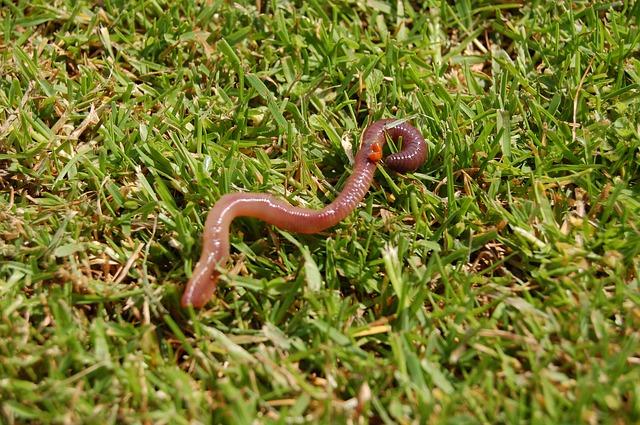
Earthworm holes are generally considered for new grass.
Earthworms are a large group of soil-dwelling worms that are regarded as natural soil aerators. Earthworms are usually seen in the soil during the morning or evening when watering the grass. If there is a large population of earthworms in your lawn, you might see small holes in the yard and some granular pellets of soil lying around in the grass.
Earthworm holes are in the form of narrow tunnels. They create holes by swallowing soil as they burrow, feeding on partially decomposed organic matter and microorganisms. Their burrowing activity is usually considered beneficial. It mixes nutrients with soil and helps loosen up the dirt, which helps the new grass grow.
Control
Even though earthworms dig small holes in the lawn, they are considered essential soil organisms for a healthy lawn. Therefore, it is better to leave them alone. However, if there are too many of them, their burrowing activity can create uneven ground levels. You can use a flat shovel to plain the ground to solve this problem.
Also, to reduce earthworm activity in your lawn, you can try to collect mowing clippings from the lawn as well.
See also: Best Worms For Composting: Its Basics and Guide for Beginners!
Rats
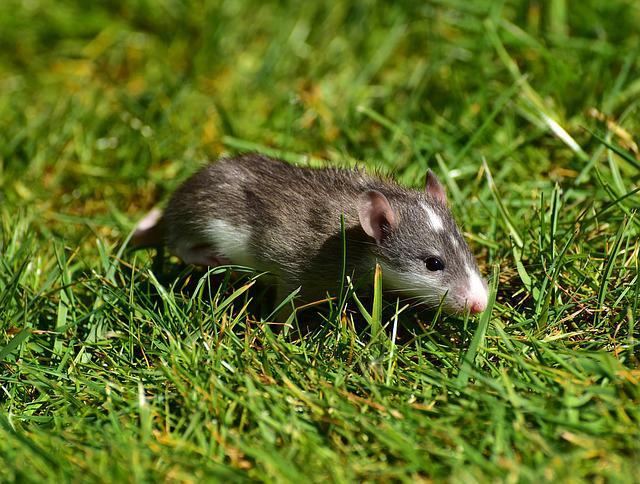
A severe rat infestation can not only ruin your lawn, but the rats might enter your home and ruin your belongings.
Rats usually burrow small holes in areas near large roots, fences, and tree snags. Rat holes are around 2 to 3 inches in diameter, and you might notice damaged grass or chewed grass clippings near the hole openings.
Rats dig tunnels under the soil, resulting in a collapsed turf in various spots. Typically, there will also be scattered soil just outside the opening of rat holes.
Control
The presence of too many holes in the lawn can not only be harmful to the turfgrass, but the rats can also enter your home and damage your property and belongings.
To get rid of rats, remove any lying around log piles, mow overgrown grass and use a natural rat repellent.
Moles
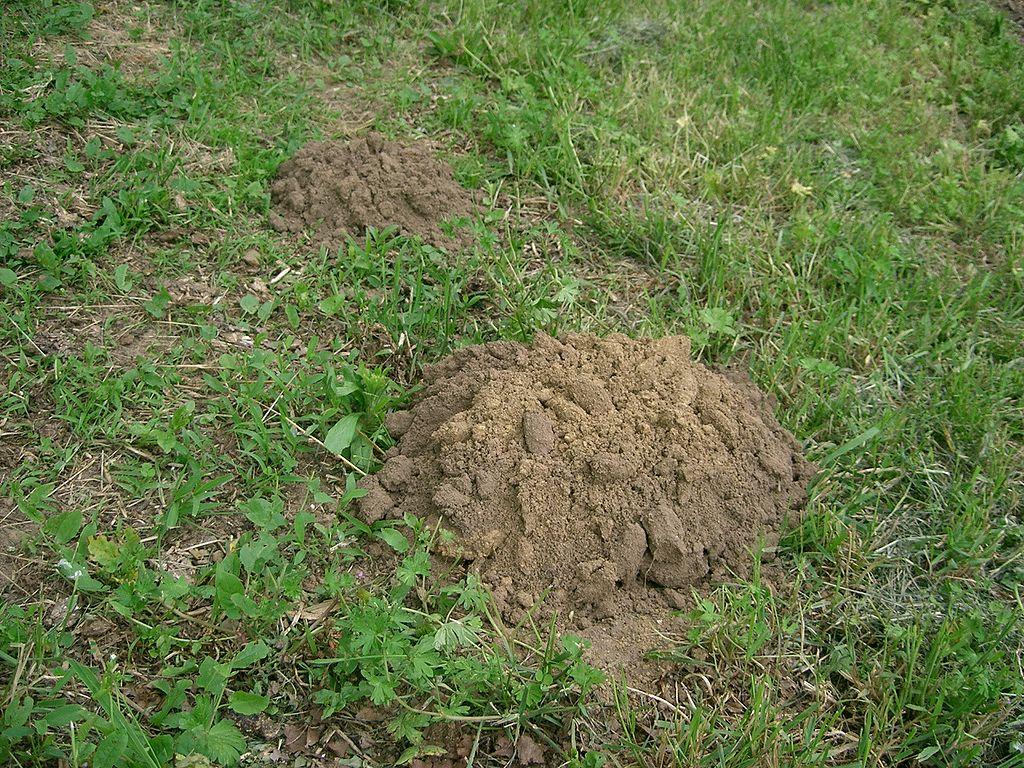
Mole holes usually do not have any openings.
Moles dig tunnels and tower-like holes that result in the formation of uneven surfaces in the lawn. Their tunnels are roughly ten inches beneath the surface of the soil. Usually, mole holes hardly have any openings, making detecting their presence difficult.
However, if you see any volcano-shaped mounds in your lawn soil, chances are it is made by a mole. Moles rarely come outside and feed on grubs and other insects inside their tunnels.
Control
The first thing you should do to eliminate moles is remove their food source. Next, you can use pesticides to kill grubs in your lawn, driving the moles out. Also, you can use castor oil pellets to repel the moles as well.
Castor oil has a characteristic smell that keeps rodents such as moles, voles, rats, and field mice away.
Squirrels and Chipmunks
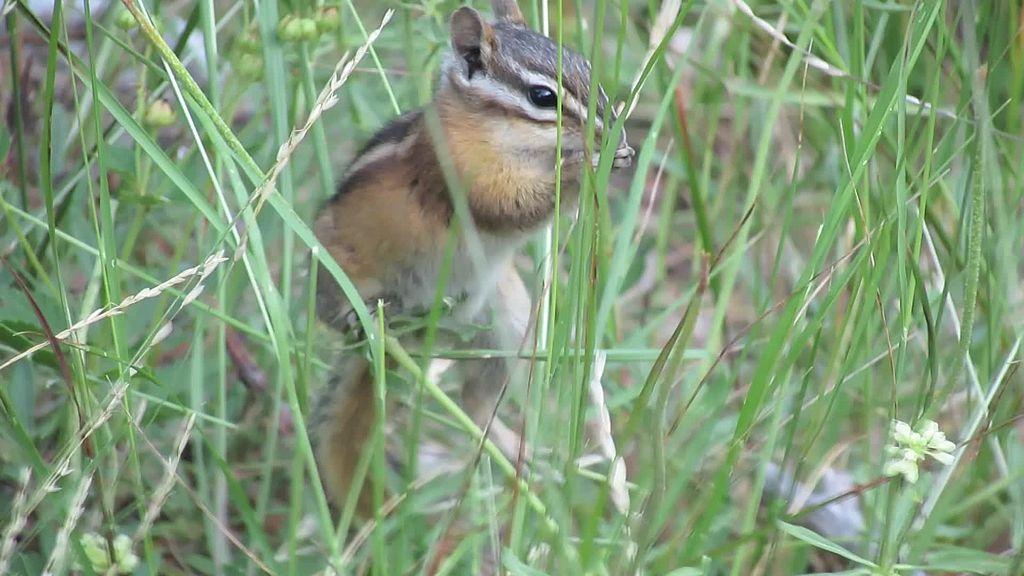
They might look adorable, but they can be a real headache for some lawn owners and gardeners.
Both squirrels and chipmunks dig holes to store and hide their food. However, Eastern gray squirrels are the culprit of invading lawns more frequently than any other squirrel species. Sometimes, squirrels also dig up lawns to feed on tubers and roots. Chipmunk holes are usually found in areas with log piles.
Aside from digging holes for food storage, they use holes to hide from danger. Their food generally consists of nuts, seeds, and grains. So, if you see any of these things lying around in your lawn with unidentified holes in the lawn, it is chipmunks.
Control
No matter how hard you try, you will not catch a squirrel or chipmunk because they run fast. Your best bet to catch them is by setting rodent traps. However, if the infestation is on a large scale, you might want to talk to pest experts.
Voles
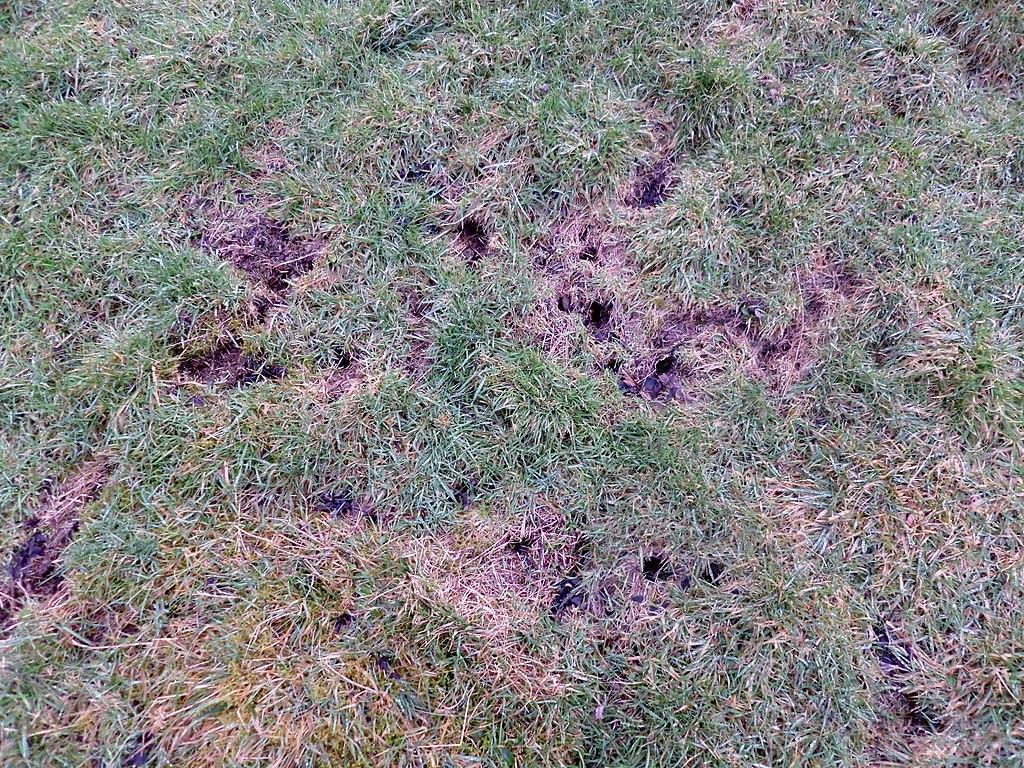
Damage caused by voles in a law.
Voles are also rodents that might be responsible for small holes in your lawn. You can easily tell if a hole is made by a vole or not by looking for chewed grass clippings near the hole opening. Vole holes are around 2 to 3 inches in diameter on average.
In addition to the grass clipping, you might also find scraps of fruits, vegetables, and flowers near a vole hole. Not only can voles ruin a lawn aesthetically, but they can also ruin tree roots and the health of your lawn in the long run.
Control
Because of their nature, chemical and trapping control methods are usually not very effective against voles. However, to reduce the chances of a vole infestation in your lawn, do not let any wood piles sit around in your yard. Also, transfer trash and compost areas as away as possible from the lawn.
Birds

Too many birds can damage a lot of grass while digging through the ground to feed on insects.
Another reason you might see unidentified holes in your lawn is the presence of birds. Birds usually gather around in large numbers in the yards when there is plenty of food for them. Their food includes grubs, ants, termites, and insect larvae. So, if you see too many birds in your yard, chances are there are also some lawn pests lurking around.
However, it is not something you should be worried about. Birds add to the aesthetics of a lawn, and also, they are a great help in getting rid of nasty bugs and pests from your lawn. Some of the birds might also be pollinators of plants in your lawn.
Control
Usually, birds are not a significant reason behind unidentified small holes in the lawn. However, if there are too many of them, they might uproot a lot of grass during their feeding activities. So, you should keep your lawn free of bugs and pests and maybe also let your children run around the lawn to keep the birds flying!
Pros And Cons of Using Straw To Cover Grass Seed In A Newly Seeded Lawn
How To fill holes In A Lawn?
Depending on the size and number of holes in your lawn, the method you need to choose to fill the holes will vary. You can simply use topsoil or compost to fill the holes up for one or two small holes. However, in case of severe damage to your lawn caused by the animals mentioned above or any other reason, you might have to work a bit harder. Here are the steps that you can take to fill the holes in your lawn correctly:
- Take a shovel and remove the top layer of grass sods around the holes. If the hole leads to a tunnel, dig as much as possible.
- Following that, fill the holes with compost or topsoil. Adding compost will ensure that the newly germinated grass seedlings get a good head start.
- If needed, add sod plugs from other lawn areas to the newly added soil that you used to fill up the holes.
- Water the place and keep watering twice a day until the new soil becomes fully covered with grass.
Frequently Asked Questions
What is digging holes in the lawn overnight?
Several different animals can dig holes in the lawn overnight. These include rodents, reptiles, and some mammals such as foxes. These sneaky animals come out at night when there are no people around and dig small holes in the lawn overnight. Depending on the size and type of hole, you can usually guess which animal might be responsible for digging holes in the lawn overnight.
What insects make small holes in the ground?
Ants, termites, beetles, wasps, and bees are all responsible for digging holes in the ground from time to time. Sometimes they do it so that they can lay eggs; other times they do it so they can find something to eat. Additionally, some insects are permanent ground dwellers, meaning they spend their entire lives inside the ground.
Do snakes make holes in the yard?
Not all, but some snakes make holes in lawns, yards, and gardens. They might do it to seek shelter in tree hollows, under logs, leaf litter, or in holes or burrows made by other soil-dwelling creatures. Finding snake holes in a lawn can be pretty scary and for a good reason. You never know what snake might be lurking inside the hole.
It is better to call relevant authorities instead of trying to examine snake holes on your own. However, if you are curious, make sure you have all the protective gear before you go exploring unidentified holes in the lawn.
Sources For Further Reading
- What’s Making This Hole in My Yard???. Retrieved 13 April 2022, from https://caldwell.ces.ncsu.edu/2018/04/whats-making-this-hole-in-my-yard/
- Holes in the Lawn. (2022). Retrieved 13 April 2022, from https://hgic.clemson.edu/factsheet/holes-in-the-lawn/
- Diagnosing Holes in the Yard. (2022). Retrieved 13 April 2022, from https://naturalresources.extension.iastate.edu/wildlife/diagnosing-holes-yard
Now that you know about holes in your lawn, make sure to also read our other articles:
Common Lawn Weeds With White Flowers (And How To Get Rid Of Them?)
Common Lawn Weeds With Yellow Flowers (And How To Get Rid Of Them?)
Is Sand Good For Lawns? (and What Type of Sand for Lawns Is Best)







